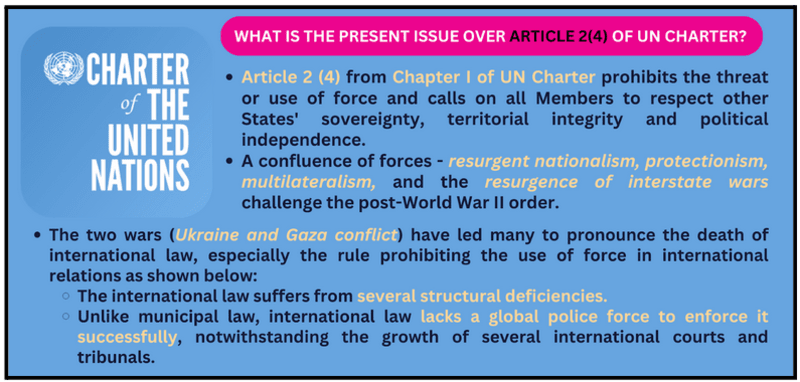Why international law matters?
“It isn’t enough to talk about peace. One must believe in it. And it isn’t enough to believe in it. One must work at it.” —Eleanor Roosevelt
Relevance: GS II (International Relations)
- Prelims: Article 2(4) of UN Charter;
- Mains: International Organizations; Current Geo-political Issues;
Why in the News?
Although, the International laws and its attendant structures are not ideal considering present geo-political issues, still the world would be worse off if they are not judiciously present.
|
About:
|

What needs to be done?
1) Need to move beyond Compliance:
- To determine the poor Compliance of Law: According to the international critics, a poor compliance record with international law is sufficient to show that it is inconsequential (not significant). The concept of compliance is inadequate to understand whether international law has normative effects.
- A narrow focus on rule compliance elides international law’s normative interaction with different actors, both State and non-state.
- To determine the Efficacy of Law: The national courts often use international law to interpret domestic law to enlarge its content, even if that international law has not been implemented through domestic legislation. Thus, assessing the usefulness of international law requires shifting the benchmarks away from a general theory of compliance.
- And if compliance alone was the matrix to determine the efficacy of law, a lot of domestic law would also have to be declared useless, given the innumerable violations in municipal legal systems.
- Need to work on complex Transnational Legal Process: When a country engages with international law, it triggers a complex process of institutional interactions whereby global norms are debated, interpreted, and internalized by that nation’s domestic legal system.
- This transnational legal process that leads countries to obey international law is important because there are certain material benefits or policy goals, such as combating climate change or fighting terrorism, that only international law can help achieve.
2) Need for Accountability:
- Need to signify laws beyond materialistic outcomes: The fundamental attribute of any legal system should be its ability to distinguish between sheer public power and legitimate authority.
- International law matters because, through its argumentative practices, it has the potential to hold those who wield public power accountable for their conduct.
|
CASE STUDY: In December (2023), South Africa moved the International Court of Justice (ICJ) alleging that Israel’s conduct in Gaza violates the Convention on the Prevention and Punishment of the Crime of Genocide. This accountability stems from several factors such as states as well as private individuals invoking international law to ask questions of those in power and make a case if their actions are illegitimate. |
- Need to stick on ideology: The present system of international laws that holds those in power accountable is not ideal; it does push countries and actors to explain their conduct.
- For example, the fact that Israel has attempted to legitimize its actions (how their military offensive is consistent with international law) using the phraseology of international law in the eyes of various constituents. Hence, the International law and its attendant structures are not ideal.
Conclusion: International law must be molded and accentuated to become an instrument that holds the powerful accountable in international relations. International law should be marshaled each time men who are drunk with power wish to act as they please. The world needs more, not less, of fair international law to constrain expansionist, imperial, and illiberal propensities.
BEYOND EDITORIAL
WORLD AT CROSSROADS:
- The Resurgence of Nationalism
- The rise of nationalism fueled by cultural wars, political polarization, economic inequalities, and resentment against elites threatens to redefine globalization and its trajectory.
- The widening gaps between the rich and the poor, culture wars, and mass immigration have created fertile ground for the rise of nationalist sentiments.
- Minilateralism, a pragmatic and agile alternative to traditional multilateralism, emerges as a potential solution but could, in its proliferation, further fragment global governance.
- The outbreak of interstate wars, undermines the core tenets of the economic interdependence theory and democratic peace theory — the two pillars of the liberal international order.
- Protectionism is the New Normal
- Protectionism, once a relic of the past, is resurfacing as a new normal.
- In the face of economic uncertainty and globalization, the working class in developed and developing countries increasingly see protectionism as a means to safeguard economic stability, boost job creation, stimulate economic growth, and enhance national competitiveness, fair labour practices, and overall social well-being.
- This is evident in the administration’s recent economic initiatives like the India-Middle East-Europe Economic Corridor, the Indo-Pacific Economic Framework for Prosperity, I2U2, and the Declaration on Atlantic Partnership all of which conspicuously lack traditional free trade clauses focused on lowering tariffs and barriers.
Mains PYQs
Q. How would the recent phenomena of protectionism and currency manipulations in world trade affect macroeconomic stability of India? (UPSC CSE 2018)
Q. At the international level, the bilateral relations between most nations are governed on the policy of promoting one’s own national interest without any regard for the interest of other nations. This leads to conflicts and tensions between the nations. How can ethical consideration help resolve such tensions? Discuss with specific examples. (UPSC CSE 2015)
Q. How will you apply emotional intelligence in administrative practices? (150 Words, 10) (b) Strength, peace and security are considered to be the pillars of international relations. Elucidate. (UPSC CSE 2017)


